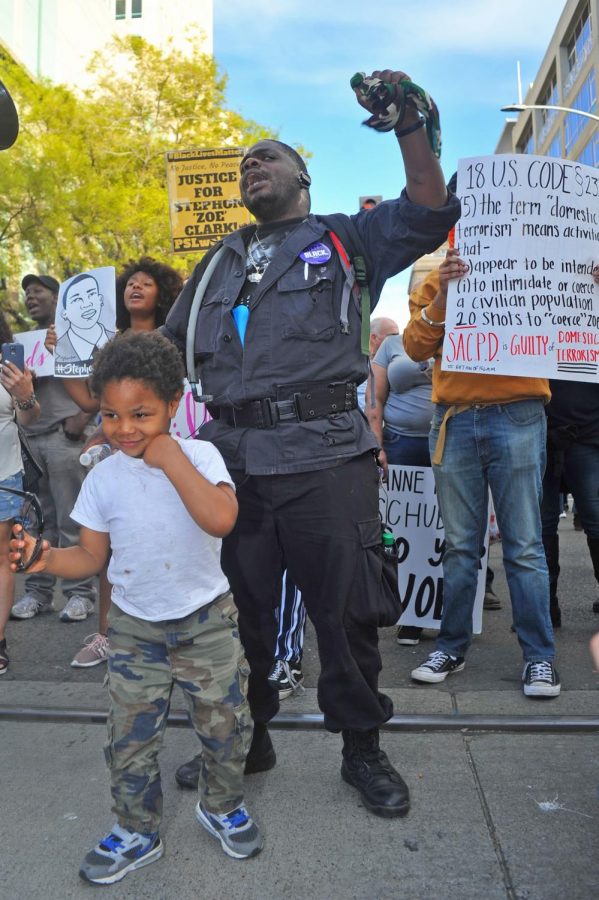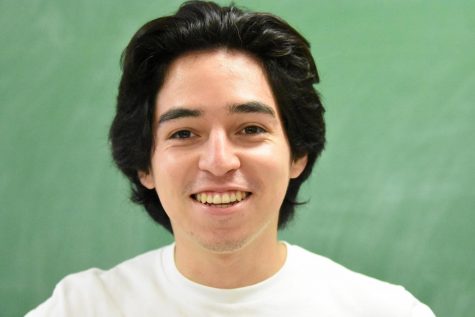Political organizers express democracy
Sacramento resident Darnell Canfield (middle) and his son chant in front of a protest line in downtown Sacramento, California.
Dec 5, 2018
The strength of a democracy lies in how the masses utilize their voice and presence to keep those in power accountable. Societies across the globe have varying degrees of freedom of speech and in many places, authoritarian regimes simply strip that power away from the public.
Political activism is a crucial part of the democratic process in America.
It is common knowledge that the inalienable right of free speech is a pillar of our nation’s Constitution.
However, that freedom is not utilized nearly enough.
According to the Pew Research Organization, the U.S. places 26th out of 32 democratic states in terms of voter turnout at 55.7 percent.
The political spectrum seems to have engulfed every facet of people’s day-to-day lives.
Talking about politics is no longer an objective discussion. Instead it runs the risk of dictating a personality, set of values and, for many people, one’s self-worth.
The question becomes, how do people in a society fight against ideas they don’t agree with. Political activism is the backbone of a healthy democracy and engaging in activism helps fight against the corruption of values.
Political science department Chairperson Vanna Gonzales explained how activism takes form in today’s society.
“Very rarely do people make a living off of activism. The majority of support will come from the general public once a subject of importance is under concern,” she said.
The public seems to tune out of what happens within their local governments, but it’s a risky gamble.
“Most activism takes place when activists take a local office and continue to pursue an actual change,” Gonzales said.
Most efforts come from individuals who continue their fights for the success of their entire community, not just for themselves.
Cheryl Sudduth is an experienced political activist who just has been elected to head the West Contra Costa Wastewater District. Her efforts and time have been spent helping to create and inspire change for multiple non-profits in the Bay Area.
“By design, a lot of people don’t know who to hold accountable and that makes people very angry,” Sudduth said.
She said that for many of the people she has met throughout the Bay Area, anger seems to be the key emotion bringing them into politics.
While anger fuels public interest, it is mostly just to find someone to blame for a problem. Rarely are solutions sought.
For Sudduth, a large part of the solution toward healing the political sphere is educating the public.
“Using my grandma’s phrase, ‘There’s not enough stick-to-it-ness from people.’ We want to help them learn how to make change,” she said.
Keeping the masses interested in a long process for change can be tough. Sudduth said the key to retaining those efforts is to make things personal. After the Camp Fire in Northern California last month, the public gained a sense of urgency.
Crises can spring up anytime and effect anyone, so the time to prepare and participate is now.
Leaders also help inspire activism to as well. Diana Diaz works with the RYSE Center in Richmond teaching political engagement to younger generations.
“They don’t get a political education sometimes, so students have to transition into leaders and organizing,” Diaz said.
The problem facing the younger generations is that “a lot of youth have lost faith in the system” so it’s more important than ever that leaders be taught how to create change.
Student cohorts are taught how to engage their local communities through campaigns.
Richmond Measures E and K on the 2018 midterm ballot were efforts brought about by campaigns from the RYSE Youth Center.
“Students get to see the changes taking place in politics — what it really looks like,” Diaz said. “They learn how to make change for their communities.”



